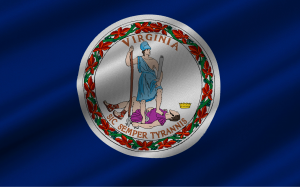
(This is the sixth installment in a series that examines hemp markets in U.S. states. Other installments: Colorado, Nevada, New York, North Carolina, North Dakota, Oregon, Tennessee and Vermont.)
You can’t make money growing hemp in Virginia. Literally, even though the plant is legal.
Virginia bans farmers from selling the crop commercially and limits hemp production to a handful of university research projects.
If that strikes you as odd for a state with centuries of experience growing hemp, you’re not alone.
Even Virginia’s top agriculture official has vowed to boost Virginia’s hemp market by pushing legislation to allow farmers to sell hemp and businesses to process the plant.
Virginia reported less than 100 acres growing hemp in 2017, and just 33 licensed growers, all growing the crop on behalf of university research.
“If anyone is growing hemp commercially in Virginia, they’re doing so illegally,” said Elaine Lidholm of the Virginia Department of Agriculture and Consumer Services, which oversees hemp.
But hemp investors and entrepreneurs shouldn’t write off Virginia.
The state’s climate, soil and manufacturing infrastructure show tantalizing promise. Hemp was a source of early wealth in Colonial Virginia. Ropes in 1700s Jamestown were made of it.
Some say it’s only a matter of time before Virginia joins neighboring Kentucky and North Carolina in boosting hemp as a new revenue source for former tobacco farmers.
“We will be a leader in hemp, no doubt about it. We just need to get red tape out of the way,” said Jason Amatucci, founder of the Virginia Industrial Hemp Foundation.
Here’s what you need to know about Virginia’s hemp market.
Industry snapshot
Virginia’s hemp industry is tiny compared to Kentucky and other former tobacco states. The first few acres in modern history were planted in 2016, and many of those acres failed because of unfavorable weather.
As of this year, Virginia has:
- 33 licensed hemp growers
- 0 licensed hemp processors
- 78 outdoor acres licensed for cultivation
All hemp production in Virginia must be done on behalf of one of four participating universities: Virginia, Virginia Tech, Virginia State or James Madison.
“Virginia basically said, ‘We don’t want to be too involved with this. We’re going to leave it to the universities,’” Amatucci said.
Disappointed farmers
Agriculture officials in Virginia say they regularly turned away interested hemp farmers when the program started in 2016.
“I would get a call every week asking, ‘How do I grow hemp?’ And I’d say, ‘Right now you sit and wait; it’s only for research,’” Lidholm said.
Would-be hemp growers argue Virginia is ceding valuable space in the booming market to its hemp-friendly neighbors.
“We’re way behind the ball,” said Graham Redfern, who plans to apply to be a 2018 Virginia hemp grower on 18 acres outside Richmond.
Redfern pointed out that Virginia’s ban on for-profit hemp growing limits investment in the industry to academic institutions that are known for tiptoeing around cannabis research.
“I can’t go in and ask my investors for money if they can’t get any return on their investment,” Redfern said.
Complaints about Virginia’s strict hemp limits haven’t gone unnoticed.
Virginia’s agriculture secretary said he plans to seek a 2018 bill allowing private hemp processors and pursuing commercial hemp opportunities.
“Virginia is working diligently to support the development of a strong, robust and economically viable industrial hemp industry in the state,” Agriculture Secretary Basil Gooden wrote this fall in The Roanoke Times.
Bullish signs
Gooden and hemp activists in Virginia seem to agree the time is right to open Virginia’s hemp market.
“The future outlook is tremendous,” Gooden wrote about hemp. “We are looking for ways to once again embrace this crop as practical and useful.”
Hemp entrepreneurs in Virginia are taking Gooden at his word and preparing to ramp up production.
Virginia grew some 23,000 acres of tobacco worth $110 million last year, according to the U.S. Department of Agriculture, and hemp has shown promise in areas once dominated by tobacco farming.
“It’s going to happen,” Redfern said. “We’re perfectly set up for it.”
Other optimists point out that Virginia’s academic research into hemp could pay dividends.
For example, the University of Virginia (UVA) this year researched hemp’s use on contaminated mining land, making it the only institution nationwide thought to be investing in possible hemp applications for waste cleanup, called phytoremediation.
“We are planning to take full advantage of the proposed amendments to Virginia’s industrial hemp laws with expanded plantings in 2018,” UVA researcher Michael Timko said in a news release this fall issued by the company that developed the hemp.
Amatucci said Virginia’s hemp potential has won over skeptical state agriculture regulators.
“The light bulb is coming on,” he quipped.
Kristen Nichols can be reached at kristenn@mjbizdaily.com

